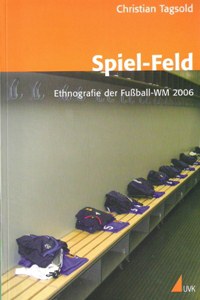Kulturelle Bedeutungen der Fußballweltmeisterschaft 2006
DOI:
https://doi.org/10.22029/ko.2011.595Abstract
Dreh- und Angelpunkt der vorliegenden Studie ist die Fußballweltmeisterschaft 2006 in Deutschland. Als so genannter Team Liason Officer der japanischen Nationalmannschaft fungierte Christian Tagsold während des Events als Bindeglied zwischen der japanischen Delegation und dem Organisationskomitee der WM. Im Mittelpunkt der Studie steht die Frage, wie die Weltmeisterschaft als vielschichtiges Ereignis ohne eindeutige Gesamtinterpretation die Menschen trotzdem faszinieren konnte. Durch Analysen symbolischer Tauschbeziehungen, Raumsemantiken und Übersetzungsleistungen spricht der Dozent am Ostasien-Institut der Heinrich-Heine-Universität Düsseldorf Prozesse der Sinngebung und Bedeutungszuweisung an, die im Turnier von den Spielern, Mitarbeitern und Fans vollzogen wurden. Mit seiner Arbeit leistet der Autor so einen Beitrag zum Verständnis von Fußball als Kultur im sozialwissenschaftlichen Sinne.
Literaturhinweise

Downloads
Veröffentlicht
Ausgabe
Rubrik
Lizenz
Alle Beiträge (nicht die Buchcover) in KULT_online seit der 50. Ausgabe erscheinen unter der Lizenz Creative Commons Namensnennung 4.0. Die veröffentlichten Beiträge dürfen Sie unter den Bedingungen der Lizenz frei nutzen, insbesondere auch für kommerzielle Zwecke und durch Bearbeitung der Beiträge (allgemeinverständliche Fassung). Die Autor_innen von KULT_online haben der Zeitschrift die Veröffentlichung erlaubt und ihre Texte unter einer CC-BY-Lizenz veröffentlicht. Es findet keine exklusive Übertragung von Verwertungsrechten („copyright transfer“) an die Zeitschrift statt. Für die Buchcover gelten die urheberrechtlichen Bestimmungen des Verlages, bitte kontaktieren Sie das Verlagshaus für jede rechtmäßige Weiternutzung. Alle Beiträge der Ausgaben 1-49 sind online frei zugänglich und unterliegen den Nutzungsbeschränkungen gemäß des deutschen Urheberrechts



